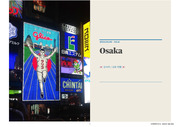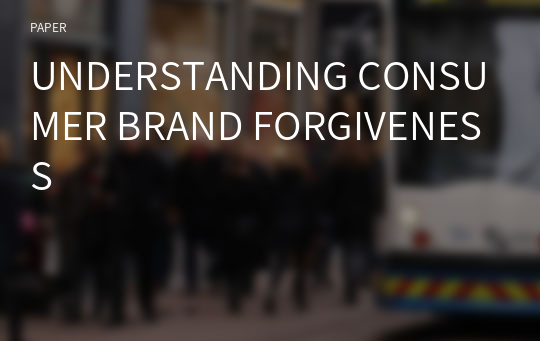UNDERSTANDING CONSUMER BRAND FORGIVENESS
* 본 문서는 배포용으로 복사 및 편집이 불가합니다.
서지정보
ㆍ발행기관 : 글로벌지식마케팅경영학회(GFMC)
ㆍ수록지정보 : Global Marketing Conference
ㆍ저자명 : Nikoletta-Theofania Siamagka, George Christodoulides
ㆍ저자명 : Nikoletta-Theofania Siamagka, George Christodoulides
영어 초록
Introduction The concept of forgiveness has been in the centre of research within the psychology domain for a number of years (e.g., Burnette, McCullough, Van Tongeren, & Davis, 2012; Fehr, Gelfand, & Nag, 2010; Mauger, Perry, Freeman, & Grove, 1992). It is surprising, however, that despite the relevance of forgiveness in marketing, the concept has failed to attract much attention and research in this area remains scarce. Few studies have looked into the importance of forgiveness in the context of marketing transgressions (Aaker, Fournier, & Brasel, 2004; Chung & Beverland, 2006; Mattila, 2001; Tax, Brown, & Chandrashekaran, 1998) and have largely focused on the services sector (e.g., Gudlaugsson & Eysteinsson, 2013; Zourrig, Chebat, & Toffoli, 2009). This study takes a broader perspective and addresses forgiveness at the brand level. Looking into consumer brand forgiveness is critical in that consumers often tend to evaluate and build relationships at the brand level rather than the firm level (Fournier, 1998). This research adopts a multi-method, multi-stage approach to conceptualise and operationalise brand forgiveness. Literature Review Forgiveness in the psychology literature has been defined as ‘the willful giving up of resentment in the face of another’s (or others’) considerable injustice and responding with beneficence to the offender even though that offender has no right to the forgiver’s moral goodness’ (Baskin & Enright, 2004, p. 80). Most of the literature on interpersonal forgiveness supports a multi-dimensional structure, consisting of affective, cognitive and behavioural components (e.g., McCullough, Worthington Jr, & Rachal, 1997). Interestingly, forgiveness in psychology has been seen as a relationship-constructive mechanism, similar to accommodation (Rusbult, Verette, Whitney, Slovik, & Lipkus, 1991) and willingness to sacrifice (Van Lange et al., 1997). It can also be understood as a psychological factor that is associated with restored relational closeness following an interpersonal transgression, in that it leads to the inhibition of avoidant behaviors and the facilitation of conciliatory behaviors (McCullough et al., 1997), as well as cooperation (Komorita, Hilty, & Parks, 1991) following interpersonal offenses. Despite the fact that most of the literature examines forgiveness following a specific offense, the concept has also a dispositional character, which very few studies addressed (e.g., Berry, Worthington, Parrott, O’Connor, & Wade, 2001).Forgiveness in the marketing domain has mostly been investigated in the context of services failures (e.g., Tsarenko & Tojib, 2011; Zourrig et al., 2009). Most of the research in this area relates to the concept of consumer forgiveness, which is defined as ‘consumers’ willingness to give up retaliation, alienation, and other destructive behaviours, and to respond in constructive ways after an organisational violation of trust and the related recovery efforts’ (Xie & Peng, 2009, p. 578). This definition highlights the behavioural component of forgiveness and fails to capture the cognitive and emotional aspects encapsulated in the concept (McCullough et al., 1997). In addition, the focus on ‘organizational violation’ is highly problematic as consumers often tend to evaluate and build relationships at the brand level rather than the firm level (Fournier, 1994). Transgressions addressed in the existing literature include moderately fit brand extensions (Fedorikhin, Park, & Thomson, 2008), negative PR (Xie & Peng, 2009) and delayed product launches (Herm, 2013). When conceptualising consumer forgiveness, Chung and Beverland (2006) suggested that the process of forgiveness provides a foundation for relationship restoration, which ultimately results in rebuilding trust (Chung & Beverland, 2006; Schoorman, Mayer, & Davis, 2007). Methodology Consistent with Churchill’s paradigm (1979) for scale development, qualitative data was first collected using 16 in-depth interviews with British consumers to better understand the concept of brand forgiveness and to identify pertinent dimensions. The interviews lasted on average 40 minutes. Based on the literature and the interviews an initial pool of items tapping consumer brand forgiveness was created. A questionnaire was subsequently developed that included the aforementioned item pool as well as demographic and nomological network variables. Data was collected in the UK using an online consumer panel. 603 fully completed questionnaires were returned. In line with scaling procedures (Chrurchill 1979) we divided the sample into two sub-samples: calibration (n=302) and validation (n=301). Results and Discussion The qualitative data supported the three-dimensional structure of consumer-brand forgiveness, which is consistent with the conceptualisation of interpersonal forgiveness (McCullough et al., 1997). For example issues regarding disappointment for the brand’s wrongdoing, impact on evaluations as well as intentions to switch to another brand emerged from the interviews. In line with our findings and extant research in this area, we define consumer brand forgiveness as the consumer’s cognitive, affective and behavioural response to a brand’s (perceived) wrongdoing. The quantitative data was used to confirm the dimensionality of the construct and develop a scale that measures consumer brand forgiveness. CFA was performed on the calibration sample and through an iterative process an acceptable fit was obtained; χ2 (24)= 70.495; GFI= .95; CFI= .98, TLI= .97, RMSEA= .08. Internal consistency and composite reliabilities were also within acceptable levels; α= .79, CR= .83 (cognitive), α= .85, CR= .86 (affective) and α= .96, CR= .96 (behavioural).CFA was then performed on the validation sample and acceptable fit was once again obtained; χ2 (24)= 70.800; GFI= .95; CFI= .98, TLI= .96, RMSEA= .08. All internal consistency and composite reliabilities were above .70; α= .82, CR= .82 (cognitive), α= .82, CR= .82 (affective) and α= .94, CR= .94 (behavioural). Convergent and discriminant validities were established using Fornell and Larcker’s criteria (1981). Table 1 provides a summary of the CFA results. The next step involved criterion-related validity tests, where two variables were drawn from relevant literature from both the psychology and the marketing literature, including brand love and relationship satisfaction. Regression analysis shows that brand forgiveness results in brand love (β= .32, p< .01) as well as relationship satisfaction (β= .69, p< .01). This confirms existing literature that forgiveness can lead to positive emotions (Takaku, 2001) and satisfaction with the relationship (McCullough et al., 1998). Conclusion and Implications for Theory and Practice Despite extensive research on interpersonal forgiveness, there is very little scholarly enquiry into forgiveness in the marketing domain. This is an important area for marketers to understand since forgiveness is likely to result into stronger relationships whilst the lack of it is may have detrimental effects on customer retention and advocacy. This study contributes in this area by providing an enriched conceptualisation of consumer brand forgiveness in the context of a brand’s wrongdoing and by developing a psychometrically sound scale that measures the levels of consumers’ brand forgiveness. Following a multi-stage methodology, our results establish a three-dimensional structure of consumer brand forgiveness, encompassing cognitive, affective and behavioural elements. The study also provides some initial insights into the consequences of forgiveness. Positive outcomes, such as brand love and relationship satisfaction are important outcomes of brand forgiveness. Following from these results, some important managerial implications could be identified. For example, managers could benefit significantly from reinforcing forgiveness, as this could lead to stronger ties with the brand and increased levels of satisfaction. A brand’s wrongdoing that subsequently results in affective, cognitive and behavioural forgiveness on the part of the consumer will benefit the brand. Managers should therefore not only focus their recovery strategies on behavioural forgiveness but also target strategies to ensure affective and cognitive forgiveness. Managers who are successful in building strong relationships with their customers might be more able to promote consumer brand forgiveness and therefore enjoy the positive benefits of the process. Therefore, CRM programs could be very useful in strengthening the relationships with customers and therefore have a greater likelihood of forgiveness should a wrongdoing occurs.참고 자료
없음"Global Marketing Conference"의 다른 논문
 THE ROLES OF GREEN PACKAGING IN UGLY FOOD PURCHASE INTE..22페이지
THE ROLES OF GREEN PACKAGING IN UGLY FOOD PURCHASE INTE..22페이지 THE IMPACT OF INDUCED AWE ON ETHICAL TOURIST BEHAVIORS5페이지
THE IMPACT OF INDUCED AWE ON ETHICAL TOURIST BEHAVIORS5페이지 A BIBLIOMETRIC ANALYSIS OF SPIRITUAL TOURISM RESEARCH15페이지
A BIBLIOMETRIC ANALYSIS OF SPIRITUAL TOURISM RESEARCH15페이지 SOCIAL NETWORK ANALYSIS AND RESPONSE TIME TESTING: CONS..11페이지
SOCIAL NETWORK ANALYSIS AND RESPONSE TIME TESTING: CONS..11페이지 THE EFFECTS OF PARA-SOCIAL INTERACTION ON ONLINE CELEBR..3페이지
THE EFFECTS OF PARA-SOCIAL INTERACTION ON ONLINE CELEBR..3페이지 THE INFLUENCE OF OPINION LEADERS ON DAILY DEALS USER’S ..3페이지
THE INFLUENCE OF OPINION LEADERS ON DAILY DEALS USER’S ..3페이지 HOW IMMERSIVE RETAILING AFFECTS CONSUMERS’ URGE TO BUY:..6페이지
HOW IMMERSIVE RETAILING AFFECTS CONSUMERS’ URGE TO BUY:..6페이지 KEY TO SUPERSTARDOM IN A GLOBALISED MARKET: THE ROLE OF..6페이지
KEY TO SUPERSTARDOM IN A GLOBALISED MARKET: THE ROLE OF..6페이지 A POST-PANDEMIC LOOK AT TOURISTS’ PERCEIVED COOLNESS OF..4페이지
A POST-PANDEMIC LOOK AT TOURISTS’ PERCEIVED COOLNESS OF..4페이지 EXTRACTING OFFLINE RETAIL SHOPPING PATTERNS: OLLABORATI..5페이지
EXTRACTING OFFLINE RETAIL SHOPPING PATTERNS: OLLABORATI..5페이지

























